In the ever-changing and constantly evolving world of marketing, new technologies have a way of transforming how we do business — both positively and negatively.
One of those latest and (potentially) greatest advancements is Google Analytics 4 (GA4). You’re likely already familiar with Google’s Universal Analytics — the previous version of the tool. However, GA4 has a different data structure and collection method that may take some getting used to.
We were curious how marketers are adjusting to this new version of Google Analytics ahead of the impending deadline to switch over (July 2023), so we conducted a 12-question survey that was sent to and answered by over a hundred digital marketers.
Here’s what we found out:
Key Findings
- Many industry professionals were quick to jump on the new technology train. 65% of responders have already begun using GA4, but only 50% of those respondents use it as their primary web analytics tool. That means only one-third of respondents have shifted to GA4 in earnest.
- There are several alternatives to GA4, but 55% of respondents noted they haven’t considered any. Other popular options people opt for instead of Google Analytics include Semrush, HubSpot, Heap and Matomo Analytics.
- Marketers care about ease of use (36.6%) plus reporting and data access (39.6%) above cost and functionality, making the actual abilities of the software a key element when it comes to the decision-making process.
- Many people aren’t too keen on GA4 and the way it structures and collects data. 68.4% percent of people said they are either researching their options or are completely lost.
Subscribe to
The Content Marketer
Get weekly insights, advice and opinions about all things digital marketing.
Thank you for subscribing to The Content Marketer!
Who Did We Poll?
Before we take a deeper dive into each of these key findings, let’s take a closer look at who it is that we received answers from.
Brafton reaches a variety of professionals in a wide range of industries. Many of our respondents were marketing and advertising professionals (21.7%), but we also heard from those in consumer goods & services (9.9%), heavy industry (12.8%), information technology (9.9%) and software (13.8%), among others. Of our respondents, about 50% work within small businesses of less than 50 employees.
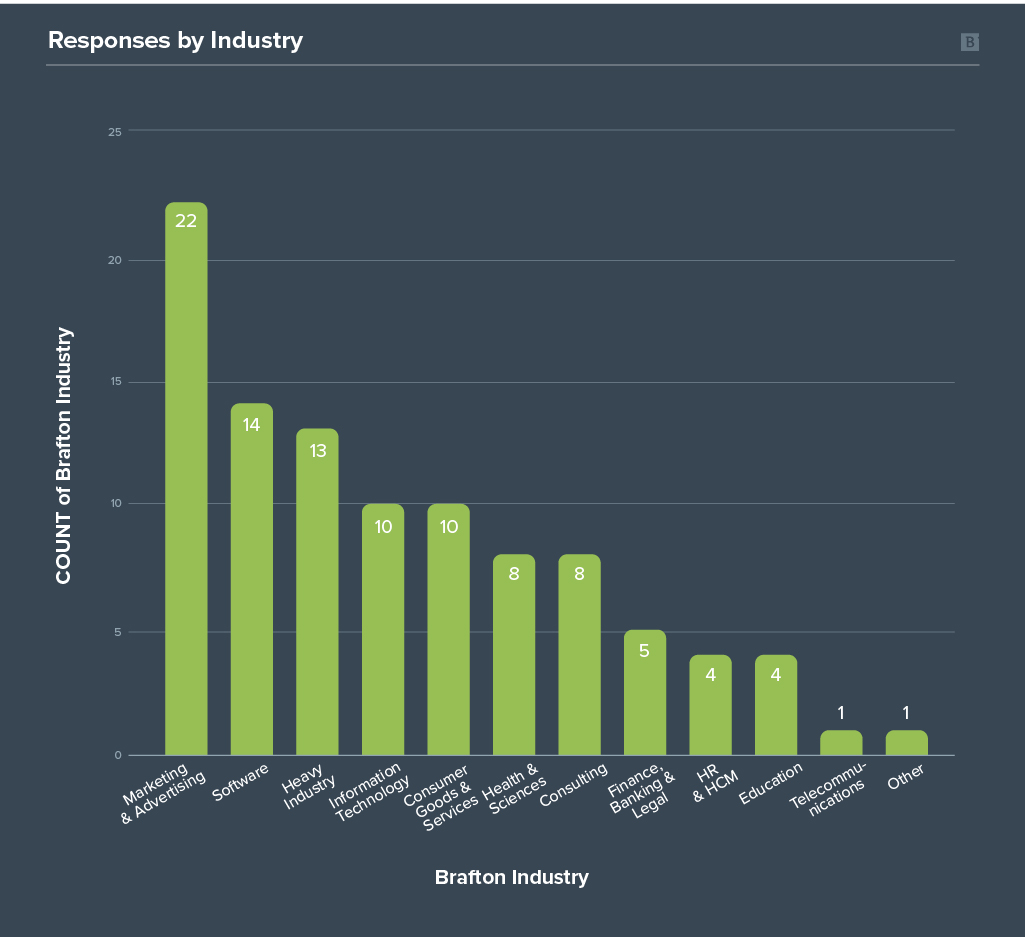
Most people’s work locations are in the Americas (80%), while other companies are operating out of EMEA (37%) or APAC (25%), making the responses internationally diverse.
Now, let’s examine our key findings.
Takeaway 1: 65% of Responders Have Already Begun Using GA4, but Only 50% Use It as Their Primary Web Analytics Tool
Our respondents were asked whether they’ve begun using GA4, or if they were sticking with their existing data collection software. As mentioned above, 65% of those surveyed have already started the process of implementing GA4 into their daily routines.
One key fact to note is that every single one of the marketing and advertising professionals marked that they’re currently using GA4. The software industry was the next highest group to dip their toes into the new software’s abilities.
Now, for every person who marked “yes” to whether they’ve begun using this new software, only 50% said they use it as their primary data tool. That means that, out of the 101 people surveyed, only 33 are actually actively employing GA4 as their champion for all things digital analytics.
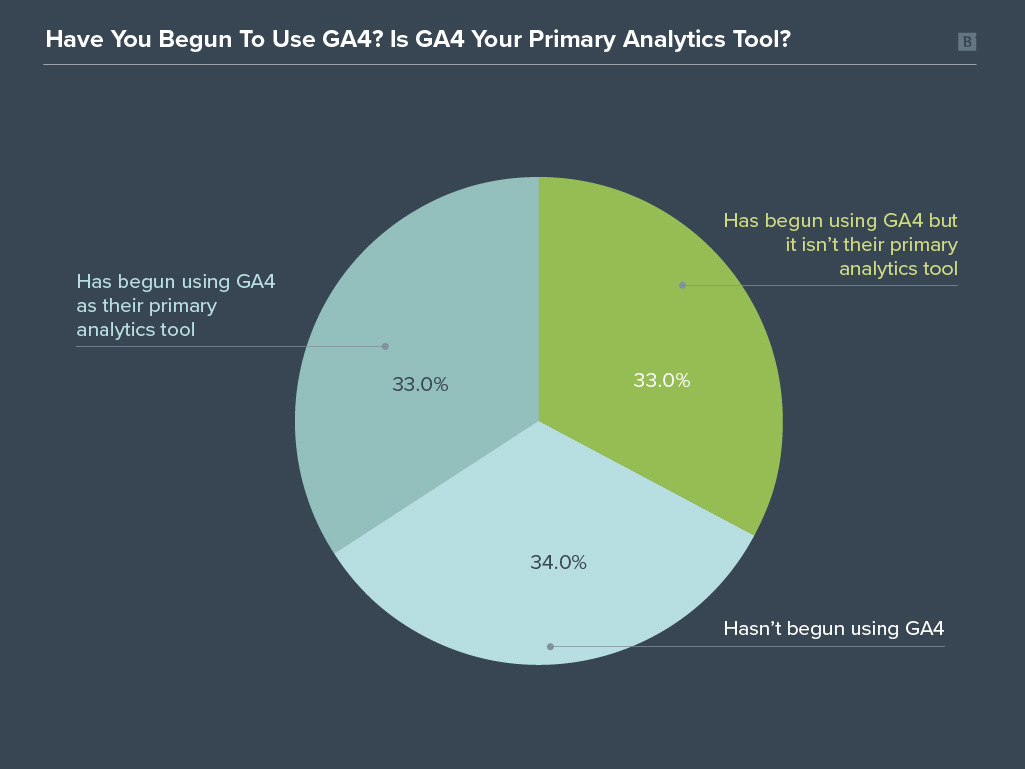
Takeaway 2: There Are Several Alternatives to GA4, but 55% of Respondents Noted They Haven’t Considered Any
The world isn’t short on GA4 alternatives, but what are the most popular options among our respondents? First, we have to note that 55% of those surveyed haven’t looked into other options, but that doesn’t mean that they don’t plan to.
Out of the other 45% of respondents, we saw tons of options that people are currently substituting for GA4, including Semrush (9.9%), Hubspot (5%), Heap (3%), Matomo Analytics (3%), Adobe Analytics (2%), Simple Analytics (2%) as well as other solutions that weren’t listed as an option.
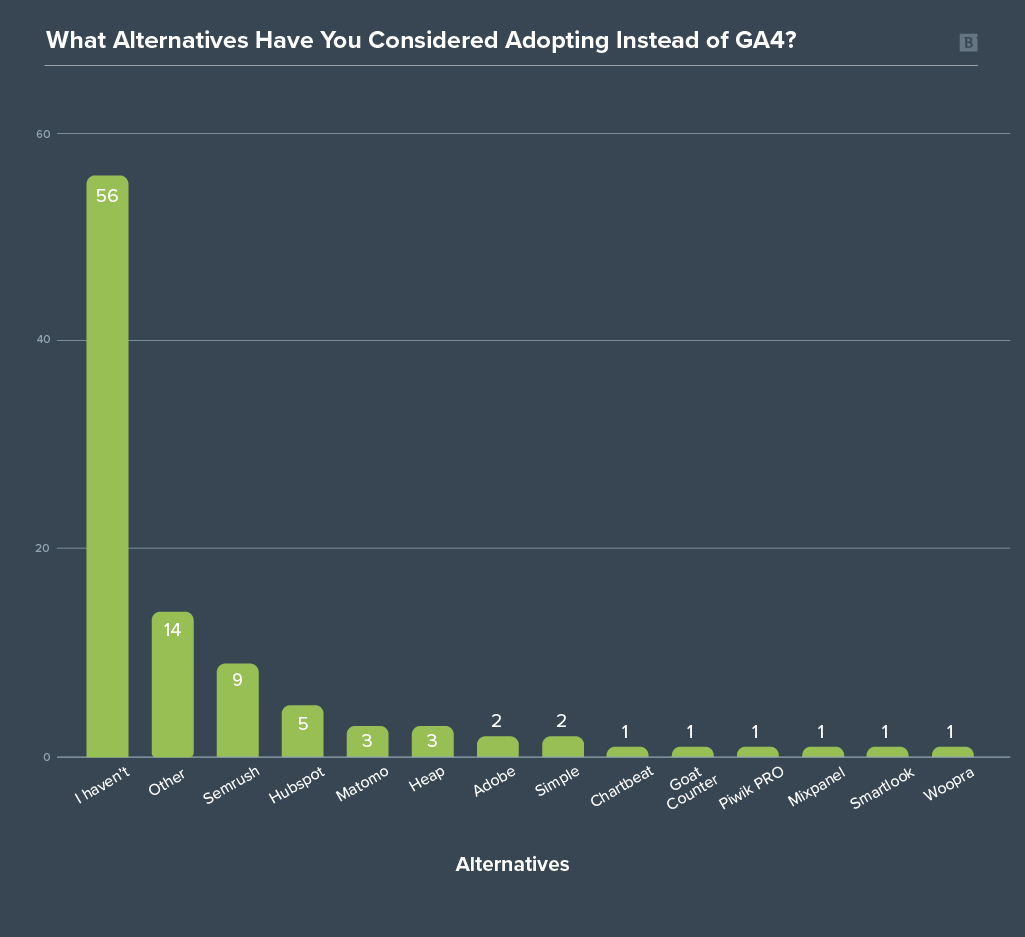
For the respondents choosing to stick with GA4 as their main data device or hoping to learn more about the tool, there were several resources listed that those surveyed are currently reading up on to gain more insight into this new software:
- Google Academy.
- Analytics Mania.
- Youtube videos.
- The Brafton Blog (not to toot our own horn).
- Professional Consultants.
- LinkedIn Learning.
- Measurement Marketing.
Takeaway 3: Marketers Care About Reporting and Data Access (39.6%) And Ease of Use (36.6%) Above Cost and Functionality
You may be wondering how marketers choose the right data software tool to work with. Well, you’re not alone — we were thinking the same thing.
When asked what matters most when choosing a web analytics platform, 39.6% of the industry professionals said reporting and data access, 36.6% said ease of use, 14.9% said functionality and 8.9% said low cost. Marketing and advertising professionals largely listed reporting and data access (50% of this industry type) as the top reason, with ease of use falling shortly behind (36% of this industry type).
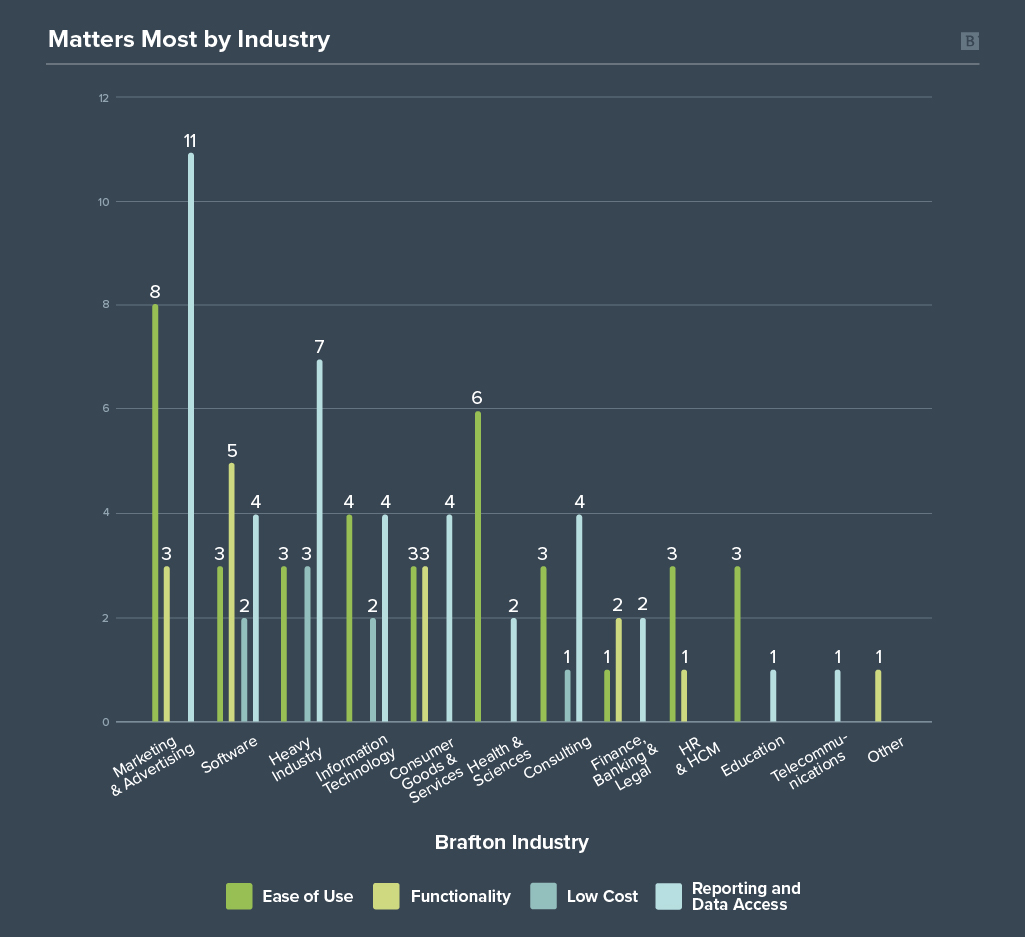
It doesn’t surprise us that marketers care most about the actual results that data software is able to pull. At Brafton, we rely heavily on accurate information to help us make knowledgeable decisions and deem efforts successful or not.
Takeaway 4: 68.4% of People Said They Are Either Researching Their Options or Are Completely Lost
You may have been able to come to this conclusion on your own, but most of the people who were surveyed don’t love the newest Google Analytics update. In fact, 43.6% of respondents said they’re currently feeling uneasy about making the transition to GA4 and are researching options, while 24.8% are simply terrified.
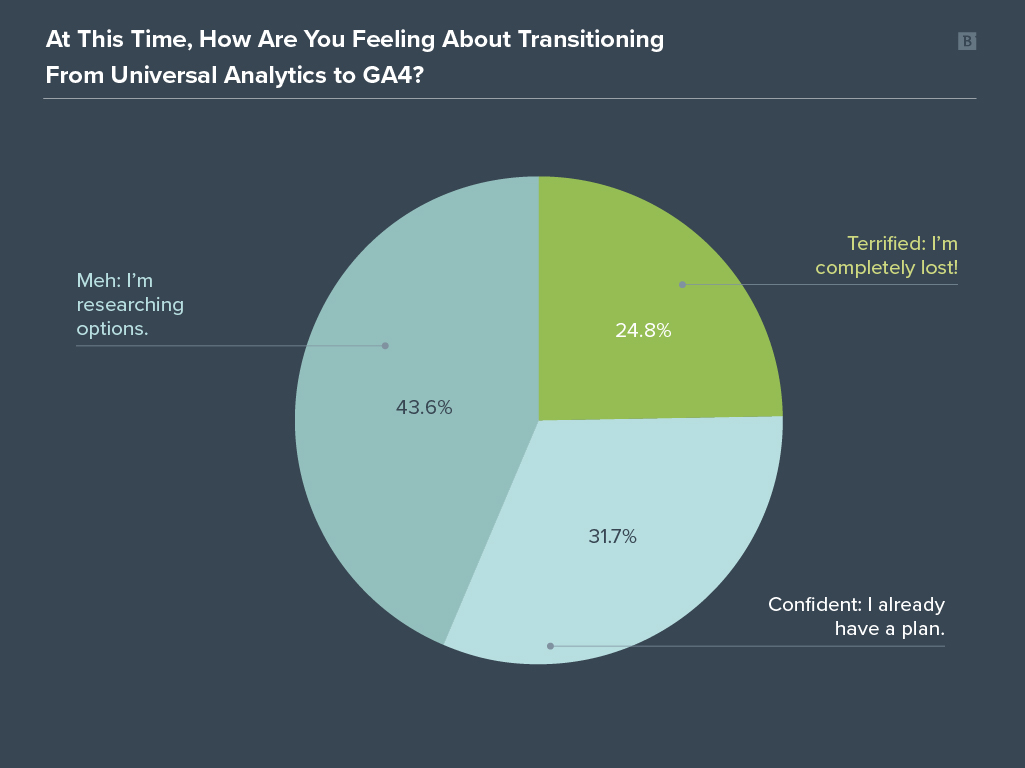
That said, 31.7% of respondents are not worried about the latest upgrade and already have a plan for employing it in their current and future work.
While our results found that the majority of several industries don’t feel self-assured about implementing GA4, the marketing and advertising and software groups are the most likely to feel confident moving forward with the up-to-date data tool. Of their industry totals, 45.4% of marketing and advertising professionals and 57.1% of software professionals have a plan of attack for all things GA4 analytics.
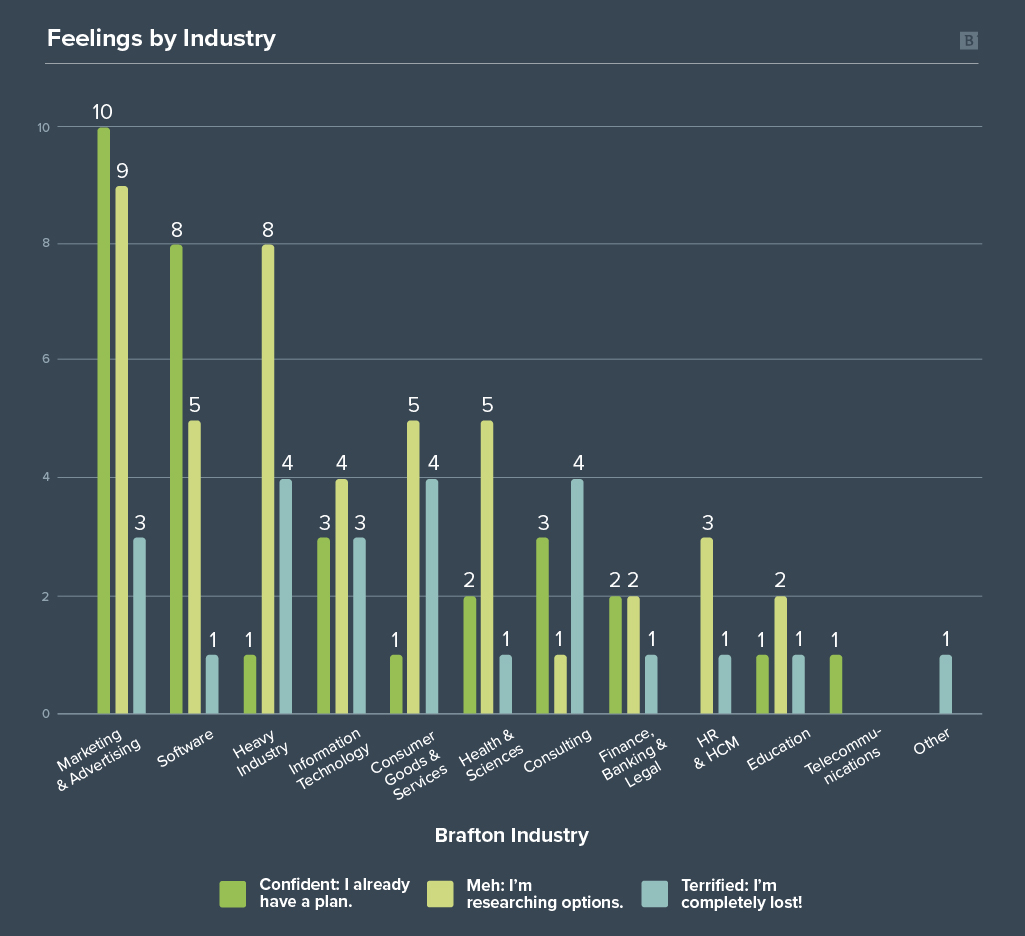
6 Tips for Those Planning to Make the Switch
So now you know what marketers and other career types think about GA4, but what did they have to say to those who are considering making the switch? Here are the nuggets of wisdom our respondents had to share:
1. Start Early so You Can Get Familiar With the Platform and Begin Collecting Data.
Yes, there’s still time to make the switch, but you don’t have to wait until the last minute. In fact, you shouldn’t. As Alisa Meredith of Semrush says: “Do it now before you’re forced to and before you risk having no data in your new property. Since GA4 only starts collecting data once you’ve set up the account, earlier is better than later!.”
2. Be Aware of the Major Differences Between GA4 and Ua.
Although they’re both analytic tools, there are some important changes in the way GA4 works that will definitely impact any digital marketer’s job.
“First, GA4 is conceptually different. It’s event-based, not page/session based. That mind shift is step one,” says Peter Milburn of Cruz Street. On that same note, Katie Fritchen of Managed Methods adds: “Pretty much everything from a B2B perspective has to be built out from scratch. It seems to be mostly focused on e-commerce websites and app data tracking.”
3. Use the Custom Definitions Section To Gain Back Some of the Data Lost Between the Upgraded Software.
At first sight, it might look like you lose data moving from Universal Analytics to GA4. However, there’s something you can do to get it back. “Utilize custom definitions. A lot of tracking that was lost can be easily set back up via the custom definitions section,” says Tyler Gardner of Ameritas.
4. Definitely Make Sure You Have Google Tag Manager Set Up Correctly.
Don’t underestimate the importance of setting up correctly your GTM. Learn how to use it, or find a professional who can do it for you.
5. Don’t Fall Into a Fear of Change.
The changes might seem scary, but don’t let yourself get lost in despair. According to Alex Birkett: “With a few weeks of poking around and learning, you’ll be back up to speed and probably getting even more value out of the new platform.”
6. Look Out for Data Accuracy.
Because GA4 is such a different platform from Universal Analytics, you’ll probably have to sort out some data discrepancies. According to the marketing team of Epos Now: “It’s important to spend time checking your data for accuracy before making any conclusions or decisions based on that data.” In the same vein, Amanda Hagley of Alert Media mentions: “In my experience, our numbers vary between GA4 and UA, so comparing data across the two sources is not ideal.”
Based on the majority of the responses, we know there are some frustrations or uncertainties when it comes to the GA4 analytics and data collection process. Some respondents said they are confident that they’ll continue to use it going forward, while others have already begun the search for a more suitable solution.
Whether you’re leaning one way or the other, it’s best to partner with a team of experts that can have your back and support your brand through strategic digital marketing and content creation.





